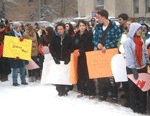Canada: National forum seeks to improve safety for First Nation communities
Published on Mon, 2012-03-05 08:14
With the Missing Women’s Inquiry ongoing in Vancouver, a Canadian national forum aimed at improving the security and safety of First Nations communities couldn’t have come at a more opportune time last month, wrote journalist Viveca Ellis on an article published by The Epoch Times international media network. The three-day Assembly of First Nations (AFN) National Justice Forum brought together national and regional First Nations, frontline justice workers, and federal and provincial government representatives seeking solutions to the rampant violence facing First Nations communities across Canada. The forum covered developing an action plan to end violence against indigenous women and girls, addressing the plight of hundreds of murdered and missing aboriginal women and girls across Canada. Sharon MacIvor (of the Canadian Feminist Alliance for International Action, one of the focal points of Social Watch in that country) and Jeannette Corbiere Lavell (president of the Native Women’s Association of Canada), provided an update on the current UN Committee on the Elimination of Discrimination against Women (CEDAW) inquiry into the disappearance and murder of Aboriginal women and girls. Following a request from the two organizations, CEDAW launched a preliminary investigation in December 2011 to determine whether to conduct a full investigation in Canada. MacIvor said a petition of 125 signatures of leading institutions requesting the committee come to Canada to conduct a full inquiry has been submitted. They are waiting for news regarding a full scale UN inquiry following a CEDAW meeting scheduled for a month from now.
A Justice strategy Developing a First Nation justice strategy related to issues such as policing, sentencing, alternative measures, crime prevention, courts and corrections, and community-based programs was also discussed. In an interview with The Epoch Times, AFN National Chief Shawn Atleo said change must be driven by communities themselves, and the forum allows aboriginals to design, develop, and implement changes as they take responsibility for enhancing the safety and security of their communities. “The vision I have is … to smash unilateral decision-making and to give aboriginal people full decision-making power. To recognize the authority of First Nations, including their accountability for making real change,” Atleo said. The forum began with a ceremony to honour families of the missing and murdered women. Dancing and drumming surrounded a long, candlelit shrine of photos of dozens of missing and murdered women that dominated the conference hall. According to the Native Women’s Association of Canada, there are 582 outstanding cases of missing and murdered indigenous women across the country.
Call for a National Inquiry A speech by Grand Chief Stewart Phillip, president of the Union of B.C. Indian Chiefs, called for a national Royal Commission of Inquiry to address the issue of murdered and missing aboriginal women and girls. “All of these pictures on this table bear witness to the fact that the status quo is absolutely killing our people. It’s killing our women. It’s killing our daughters and our granddaughters,” Stewart said. The “leadership call” for a royal commission coincided with a surprise announcement from Missing Women Inquiry commissioner Wally Oppal. Oppal said he plans to begin hearing from public panels to assist him in making recommendations to protect the lives of vulnerable women. The inquiry —investigating why serial killer Robert Pickton wasn’t caught sooner despite evidence and warnings— has conducted over 50 days of hearings since Oct.11. Oppal made a plea to aboriginal and community leaders as well as victim’s families to participate in the upcoming panels. But across town at the justice forum, Stewart spoke critically of the fact that the majority of Aboriginal groups withdrew from the inquiry because they failed to receive legal funding from the province. Source
|


